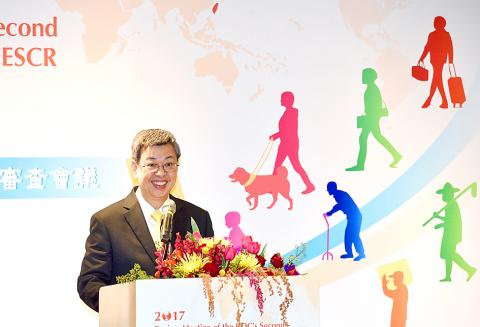The government plans to establish a national human rights institution to meet with the international Paris Principles standards, Vice President Chen Chien-jen (陳建仁) said yesterday.
The institution would promote and protect human rights and aim to prevent major violations, Chen said at the opening ceremony of the meeting for the review of the International Covenant on Civil and Political Rights and the International Covenant on Economic, Social and Cultural Rights report.
On Dec. 10, 2009, Taiwan adopted two international human rights treaties, which were the basis for establishing a human rights reporting system, and in April 2012, presented its first national human rights report.

Photo: Peter Lo, Taipei Times
Taiwan invited independent human rights bodies from the international community to visit Taipei in 2013 to review the report.
The review of Taiwan’s second national report in Taipei began yesterday and concludes on Friday. It is being broadcast live.
“Human rights are no longer an issue limited to closed-door discussions,” said the Ministry of Justice, which is working with the Presidential Office’s Human Rights Consultative Committee, chaired by Chen, to host the review meeting.
Chen said that three of the nine core international human rights treaties have not yet become law, including the Convention against Torture and Other Cruel, Inhuman or Degrading Treatment or Punishment.
The other two are the International Convention on the Protection of the Rights of All Migrant Workers and Members of Their Families, and the International Convention for the Protection of All Persons from Enforced Disappearance, he said.
The government will make every effort to enact the legislation, Chen said.
The Paris Principles are key evaluation criteria for national human rights institutions. They were adopted unanimously in a resolution by the UN Human Rights Commission in 1993 and in the final acts of the Human Rights Conference that same year.

Alain Robert, known as the "French Spider-Man," praised Alex Honnold as exceptionally well-prepared after the US climber completed a free solo ascent of Taipei 101 yesterday. Robert said Honnold's ascent of the 508m-tall skyscraper in just more than one-and-a-half hours without using safety ropes or equipment was a remarkable achievement. "This is my life," he said in an interview conducted in French, adding that he liked the feeling of being "on the edge of danger." The 63-year-old Frenchman climbed Taipei 101 using ropes in December 2004, taking about four hours to reach the top. On a one-to-10 scale of difficulty, Robert said Taipei 101

Taiwanese and US defense groups are collaborating to introduce deployable, semi-autonomous manufacturing systems for drones and components in a boost to the nation’s supply chain resilience. Taiwan’s G-Tech Optroelectronics Corp subsidiary GTOC and the US’ Aerkomm Inc on Friday announced an agreement with fellow US-based Firestorm Lab to adopt the latter’s xCell, a technology featuring 3D printers fitted in 6.1m container units. The systems enable aerial platforms and parts to be produced in high volumes from dispersed nodes capable of rapid redeployment, to minimize the risk of enemy strikes and to meet field requirements, they said. Firestorm chief technology officer Ian Muceus said

MORE FALL: An investigation into one of Xi’s key cronies, part of a broader ‘anti-corruption’ drive, indicates that he might have a deep distrust in the military, an expert said China’s latest military purge underscores systemic risks in its shift from collective leadership to sole rule under Chinese President Xi Jinping (習近平), and could disrupt its chain of command and military capabilities, a national security official said yesterday. If decisionmaking within the Chinese Communist Party has become “irrational” under one-man rule, the Taiwan Strait and the regional situation must be approached with extreme caution, given unforeseen risks, they added. The anonymous official made the remarks as China’s Central Military Commission Vice Chairman Zhang Youxia (張又俠) and Joint Staff Department Chief of Staff Liu Zhenli (劉振立) were reportedly being investigated for suspected “serious

Nipah virus infection is to be officially listed as a category 5 notifiable infectious disease in Taiwan in March, while clinical treatment guidelines are being formulated, the Centers for Disease Control (CDC) said yesterday. With Nipah infections being reported in other countries and considering its relatively high fatality rate, the centers on Jan. 16 announced that it would be listed as a notifiable infectious disease to bolster the nation’s systematic early warning system and increase public awareness, the CDC said. Bangladesh reported four fatal cases last year in separate districts, with three linked to raw date palm sap consumption, CDC Epidemic Intelligence